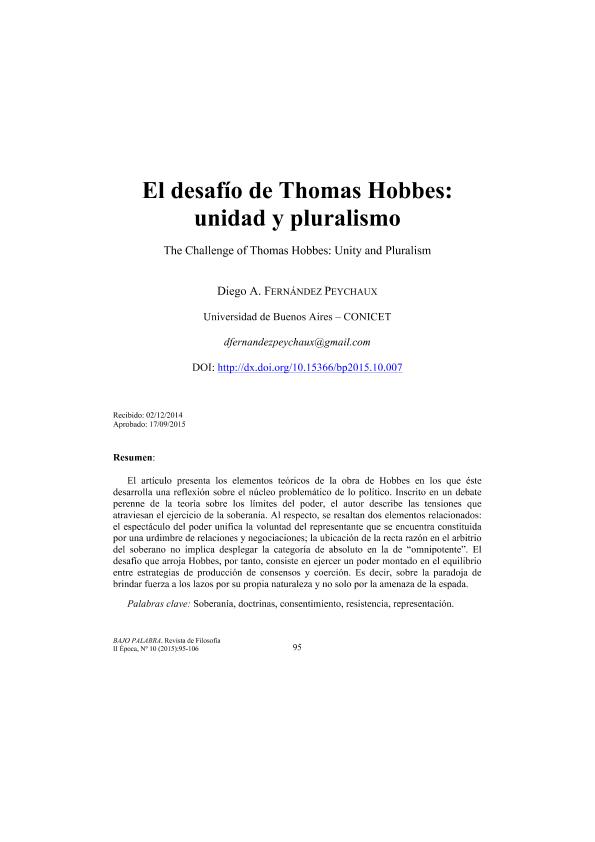Mostrar el registro sencillo del ítem
dc.contributor.author
Fernández Peychaux, Diego Alejandro

dc.date.available
2019-02-14T14:46:55Z
dc.date.issued
2015-11
dc.identifier.citation
Fernández Peychaux, Diego Alejandro; El desafío de Thomas Hobbes: unidad y pluralismo; Universidad Autónoma de Madrid; Bajo Palabra; 10; 11-2015; 95-106
dc.identifier.issn
1576-3935
dc.identifier.uri
http://hdl.handle.net/11336/70143
dc.description.abstract
El artículo presenta los elementos teóricos de la obra de Hobbes en los que éste desarrolla una reflexión sobre el núcleo problemático de lo político. Inscrito en un debate perenne de la teoría sobre los límites del poder, el autor describe las tensiones que atraviesan el ejercicio de la soberanía. Al respecto, se resaltan dos elementos relacionados: el espectáculo del poder unifica la voluntad del representante que se encuentra constituida por una urdimbre de relaciones y negociaciones; la ubicación de la recta razón en el arbitrio del soberano no implica desplegar la categoría de absoluto en la de “omnipotente”. El desafío que arroja Hobbes, por tanto, consiste en ejercer un poder montado en el equilibrio entre estrategias de producción de consensos y coerción. Es decir, sobre la paradoja de brindar fuerza a los lazos por su propia naturaleza y no solo por la amenaza de la espada.
dc.description.abstract
The article points out the theoretical elements in Hobbes’ work, which he uses to develop a reflection on the problematic core of politics. Inscribed in a perennial theoretical debate on the limits of power, the author explains the tensions within exercise of sovereignty. Two related elements stand out in particular: the spectacle of power unifies the sovereign will which is in fact constituted by a fabric of relationships and negotiations; the "location" of right reason in the arbitration of the sovereign does not imply revealing the category of absolute in the "omnipotent". The challenge Hobbes presents, therefore, is the exercise of power balanced between production strategies by consensus and coercion. That is to say, it is the paradox of not only giving strength to bonds by the threat of the sword but also by their own natures.
dc.format
application/pdf
dc.language.iso
spa
dc.publisher
Universidad Autónoma de Madrid

dc.rights
info:eu-repo/semantics/openAccess
dc.rights.uri
https://creativecommons.org/licenses/by-nc-sa/2.5/ar/
dc.subject
Soberanía
dc.subject
Doctrinas
dc.subject
Consentimiento
dc.subject
Representación
dc.subject.classification
Otras Filosofía, Étnica y Religión

dc.subject.classification
Filosofía, Ética y Religión

dc.subject.classification
HUMANIDADES

dc.title
El desafío de Thomas Hobbes: unidad y pluralismo
dc.title
The Challenge of Thomas Hobbes: Unity and Pluralism
dc.type
info:eu-repo/semantics/article
dc.type
info:ar-repo/semantics/artículo
dc.type
info:eu-repo/semantics/publishedVersion
dc.date.updated
2019-02-12T18:14:53Z
dc.journal.number
10
dc.journal.pagination
95-106
dc.journal.pais
España

dc.journal.ciudad
Madrid
dc.description.fil
Fil: Fernández Peychaux, Diego Alejandro. Universidad de Buenos Aires. Facultad de Ciencias Sociales. Instituto de Investigaciones "Gino Germani"; Argentina. Consejo Nacional de Investigaciones Científicas y Técnicas; Argentina
dc.journal.title
Bajo Palabra
dc.relation.alternativeid
info:eu-repo/semantics/altIdentifier/url/https://dialnet.unirioja.es/servlet/articulo?codigo=5252931
dc.relation.alternativeid
info:eu-repo/semantics/altIdentifier/url/https://revistas.uam.es/bajopalabra/article/view/bp2015.10.007
dc.relation.alternativeid
info:eu-repo/semantics/altIdentifier/doi/https://dx.doi.org/10.15366/bp2015.10.007
Archivos asociados
